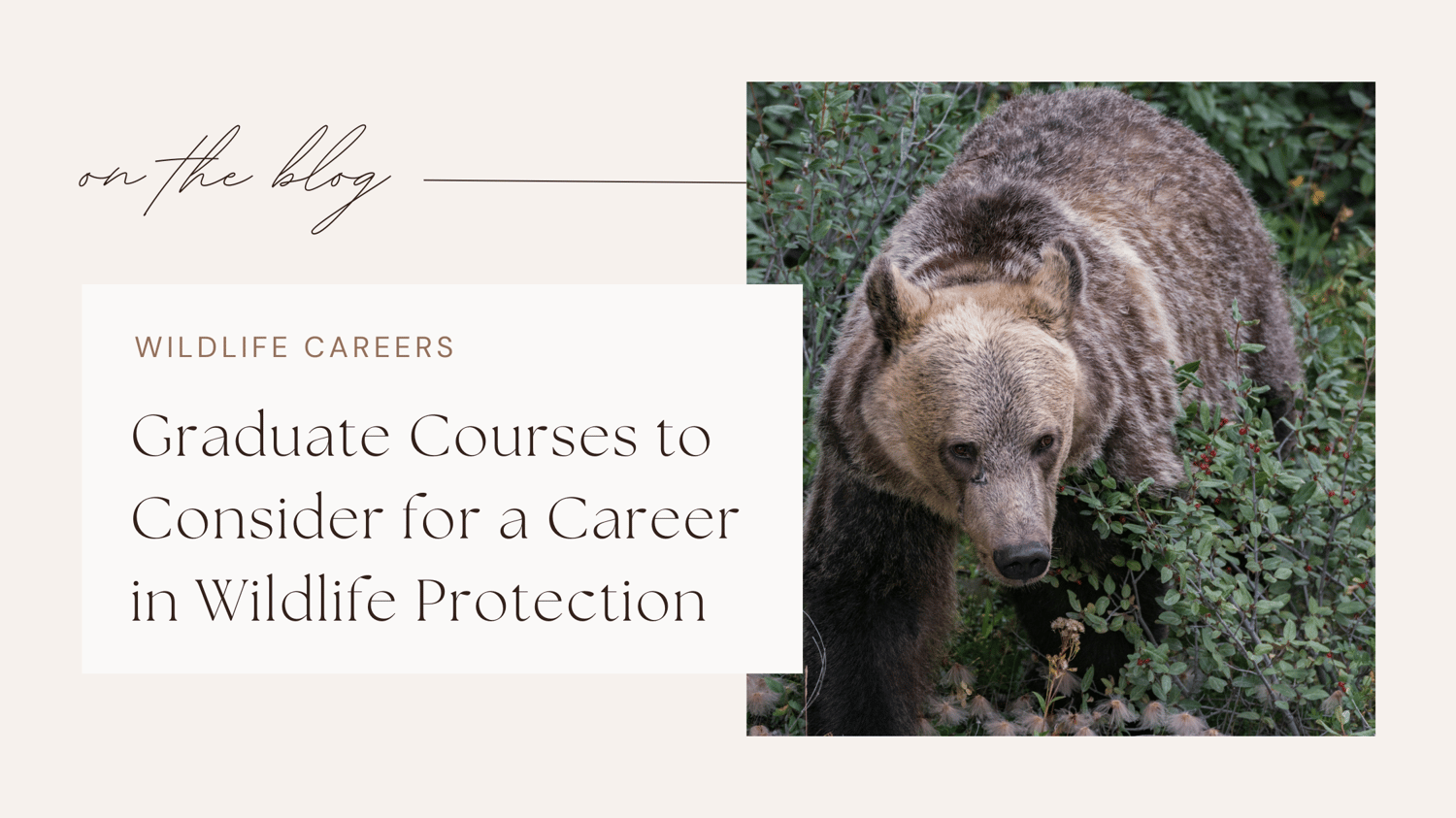For students passionate about wildlife conservation, pursuing a graduate degree can be an essential step toward gaining the knowledge and skills required for a successful career. A post-graduate course in wildlife conservation can equip you with the scientific, policy, legal, academic, and/or management expertise needed to tackle complex environmental challenges. Post grad courses can also be an opportunity to specialise into more niche areas of expertise within the wildlife sector and meet a wider variety of academics working across different focus areas.
Choosing a course that incorporates a work placement can maximise the value of the qualification with the added benefit of professional experience and industry connections. For example, UCL in the UK runs a year long masters course in Biodiversity, Evolution and Conservation MRes, with a term spent completing placements at at Zoological Society of London and the Natural History Museum!
For more info about the huge range of skills and organisations across the wildlife sector see our Wildlife Career Accelerator and Wildlife Work Directory.
Here’s a guide to some of example courses and what students can expect to learn in these fields. Note this list is not exhaustive, we suggest doing some searching of your own using resources such as www.findamasters.com.

[Credit Richard Lee]
Master of Science in Wildlife Biology and Conservation
A Master of Science (MSc) in Wildlife Biology or Conservation focuses on understanding wildlife species, ecosystems, and the threats they face. These programs often combine field-based research with lab work and emphasise conservation strategies, population dynamics, and ecology.
What You’ll Learn: Students can expect to study wildlife ecology, behavior, genetics, habitat restoration, and species conservation. Many programs offer opportunities for field research in diverse environments, from tropical rainforests to arid deserts.
Example Programs:
- University of California, Davis (USA): Offers a well-rounded program with an emphasis on both fieldwork and laboratory research.
- University of Edinburgh (UK): Known for its global perspective and diverse conservation-related courses, offering international field placements.
Master of Environmental Science and Policy
For those interested in the intersection of conservation and environmental policy, a Master of Environmental Science and Policy provides the tools to influence sustainable management practices at the local, national, and international levels.
What You’ll Learn: This course typically includes coursework on environmental policy, ecosystem management, environmental law, and climate change. Students are taught how to balance scientific research with advocacy and policy-making, a critical skill for working with government agencies, NGOs, or international organisations.
Example Programs:
- Columbia University, Earth Institute (USA): Known for its strong focus on sustainability, climate change, and environmental policy.
- Clark University (USA): Offers interdisciplinary training in environmental science, policy, and management.
- Bristol University (UK): Offers a one-year full-time or two-year part-time MSc in Environmental Policy and Management
- Oxford University (UK): Considered one of the top universities in the UK for environmental science
Master of Science in Marine Conservation
For students with a passion for marine wildlife, a specialised Master’s in Marine Conservation focuses on the protection of ocean ecosystems and species. This program blends marine biology with conservation strategies aimed at preserving marine biodiversity.
What You’ll Learn: Students will explore oceanography, marine policy, conservation of marine species like whales and sea turtles, and the impacts of human activities on the oceans. They’ll also gain practical experience through internships and fieldwork in marine environments.
Example Courses:
- University of Plymouth (UK): Offers a comprehensive course that includes both scientific and policy aspects of marine conservation.
- University of Miami, Rosenstiel School of Marine & Atmospheric Science (USA): A leading program for those seeking expertise in marine research and policy.
Master of Science in Conservation Genetics
Conservation genetics is a growing field that applies genetic principles to wildlife conservation. This degree equips students to understand how genetics can inform conservation strategies, such as managing endangered species or controlling invasive populations.
What You’ll Learn: Coursework typically includes molecular biology, genetic tools for wildlife conservation, species management, and biodiversity assessment. Students will also gain experience in lab work, analysing genetic data to aid in conservation decisions.
Example Programs:
- University of California, Berkeley (USA): Offers a strong program that focuses on genetics as a tool for conservation.
- University of Queensland (Australia): A leader in conservation genetics, particularly in regard to Australian wildlife.
- The University of Edinburgh (UK): This MSc in Applied Conservation Genetics with Wildlife Forensics is a unique programme that offers current and future wildlife professionals the knowledge, skills and global networks to address modern challenges in conservation management and law enforcement
Master of Sustainability and Conservation Management
A Master’s in Sustainability and Conservation Management is a versatile option for students interested in blending conservation with sustainable development and natural resource management. This program focuses on practical solutions to conservation challenges in the context of economic and social factors.
What You’ll Learn: Coursework will cover sustainable land use, environmental economics, ecosystem services, and natural resource management. Students also learn how to integrate conservation efforts into broader societal frameworks, working with communities, businesses, and governments.
Example Courses:
- Duke University, Nicholas School of the Environment (USA): Offers a comprehensive program in sustainable resource management and conservation.
- University of Sydney (Australia): Known for its focus on both biodiversity conservation and sustainability practices.
If conservation isn't your bag but you care about wildlife, why not look into courses focusing on animal behaviour or animal welfare instead?
Graduate courses in wildlife conservation are diverse and offer students the opportunity to specialise in areas such as ecology, policy, marine conservation, and genetics. These programs provide the essential training and experience needed to pursue meaningful careers in wildlife conservation, equipping students with the knowledge to make a significant impact on global biodiversity preservation. Whether you're drawn to fieldwork, policy, or scientific research, there is a graduate program that aligns with your career aspirations in conservation.



